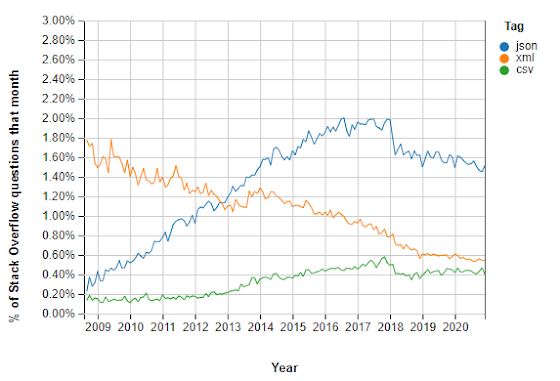Beyond JSON – The Dominance
Previous - Beyond JSON - The Emergence
By 2010, there were many JSON parsing libraries available
and JSON kept gaining the popularity amongst data exchange formats. As the
below graph clearly shows that JSON surpassed the popularity of XML by around
2012.
The big push came with the adoption of REST architectural
style along with the AJAX based frameworks like Ruby on Rails. The JavaScript frameworks like Angular (courtesy Google in
2009) and React (courtesy Facebook 2013) acted as the catalyst to the
acceptance and adoption of JSON as natural choice for data exchange. As the UI
frameworks are so JavaScript heavy that JSON did fit the paradigm very well. We
have been able to manage the user experience through the UI reactive frameworks.
Also, one of the important consideration was the testability of JSON data
dependent UI. Designers / Front End developer can independently test UI with a
high level of accuracy JSON being a human readable, text based data format.
Below reasons helped the cause.
Positives of JSON over XML
- Easy to understand
- Simple structure – Just key value pairs with arrays
- Less Verbose
- Wide libraries are available to parse the information.
- It is faster to parse a JSON
- Really good as a data format as it representing objects.
- Most of the people (non architects) know about it.
- XML is very large – XML may contain lot of meta information along with data hence increasing the size of the overall structure making it slower to transmit and parse.
- Comparatively difficult to read.
- Even empty information has a cost.
Though just a food for thought that there is a reason XML is
the choice for certain areas apart from data exchange.
- Application configuration
- Build Configuration
- Data Transformation
- System Interoperability
1. Ever wondered why configuration files never changed to JSON format !!!!
So the Question is, there any need to change from the data
exchange perspective. Or more appropriately, is it already changing? The simple
answer is, Yes. Let’s see next, why, what and how.
Next - Beyond JSON – Alternates

Comments
Post a Comment